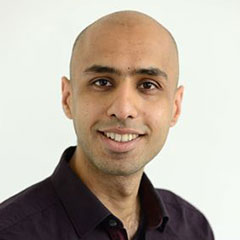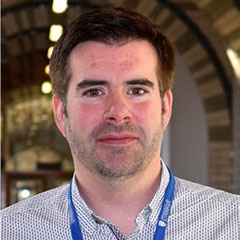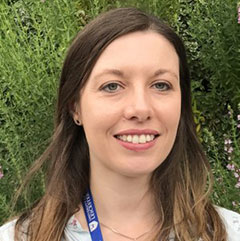Genetic Analysis of Population-based Association Studies
23–27 September 2019
Wellcome Genome Campus, UK
Learn the latest statistical methods and software for analysis of genetic association studies
Summary
This advanced course aims to give researchers involved in genetic disease studies a firm grounding in the use of the latest statistical methods and software for analysis of genetic association studies. This includes both small-scale disease-specific studies and large-scale collaborative projects including those that can be used for analysis of multiple complex traits such as UK Biobank.
The course will cover both theoretical and practical aspects of the design and analysis of such studies. Each topic will include a lecture followed by a practical session in which state-of-the-art statistical software will be applied to relevant datasets. The practical sessions will illustrate the ideas presented in the lectures. All the software used is freely available so that skills learned can be applied after the course.
The programme will also include seminars from internationally renowned researchers from the field of complex disease genetics, along with opportunities for participants to discuss their own research projects with course instructors and with each other.
Target audience and prerequisites
The course is open to scientists and clinicians/healthcare professionals engaged in relevant research. To ensure participants benefit fully from the course, applications should include clear evidence of the following existing knowledge and experience:
- a strong quantitative background (including some familiarity with statistics, mathematics or bioinformatics)
- a reasonable level of computer literacy
- a basic knowledge and understanding of genetics (both molecular genetics and concepts of inheritance/heritability)
Programme
The programme will include lecture and computer-based practical sessions covering the following topics:
Introduction to genetic association studies
• Overview and history of genetic association studies leading up to and including genome-wide association studies.
Basic association analysis and meta-analysis
• Single marker association tests (frequentist and Bayesian approaches)
• Calculation of odds ratios and relative risks
• Logistic regression
• Meta-analysis (fixed-effects and trans-ethnic)
Quality control and population structure
• Data quality control procedures to avoid the generation of spurious false positives in association studies
• The confounding effects of population structure on association studies and methods for protecting against these effects
• Multivariate (principal components) and mixed model approaches
Haplotype estimation and genotype imputation
• Methods for genotype imputation using publicly available reference panels
• Pre-phasing of haplotypes and imputation based on these inferred haplotypes
• Frequentist and Bayesian methods of testing association at imputed SNPs and indels
• Quality control for imputed SNPs
• Meta-analysis using imputed data
Heritability and mixed models
• Concepts of heritability and “missing heritability”
• Use of linear mixed modelling approaches to partition heritability and to adjust for population substructure and relatedness in genome-wide association studies
Analysis of rare variants
• Methods for analysing rare variants from re-sequencing, genotyping and imputation studies via “collapsing approaches”.
• Burden and dispersion tests of association
Mendelian randomisation
• Concepts behind using genetic variants for causal inference in epidemiology
• Descriptions of the assumptions, limitations and sensitivity analyses of Mendelian randomisation
• Practical session to apply the above and reproduce examples from the literature
Post-GWAS interrogation
• Approaches for fine-mapping and follow-up of signals from genome-wide association studies, including trans-ethnic meta-analysis
• Enrichment analyses and colocalization with expression quantitative trait loci.
Practical Sessions
Lectures are followed by practical sessions using realistic datasets so that students learn how to apply the theory. Students will use a variety of computer programs during the course including: IMPUTE2, SHAPEIT2, SNPTEST2, META, EPACTS, GCTA, FaST-LMM, PLINK.
Learning outcomes
On completion of the course, participants can expect to:
• Understand the general principles, assumptions and basic techniques used in genetic association studies
• Read and comprehend scientific articles that present results from candidate-gene and genome-wide association studies
• Analyse genetic data arising from candidate-gene and genome-wide association studies, (including quality control checks, association testing between genotype and phenotype, and post-association fine-mapping of implicated loci to point to likely causal variants, genes and pathways)
• Perform imputation of variants that have not been directly genotyped using information from genotyped genetic variants
• Perform analysis of common and rare variants, accounting for population structure and family data
Instructors and speakers
Course instructors

Heather Cordell
Newcastle University, UK

Gibran Hemani
University of Bristol, UK

Andrew Morris
University of Liverpool, UK
Guest speakers

Louise Wain
University of Leicester, UK

Gosia Trynka
Wellcome Sanger Institute, UK
How to apply
Prerequisites
The course is open to scientists and clinicians/healthcare professionals engaged in relevant research. To ensure participants benefit fully from the course, applications should include clear evidence of the following existing knowledge and experience:
- a strong quantitative background (including some familiarity with statistics, mathematics or bioinformatics)
- a reasonable level of computer literacy
- a basic knowledge and understanding of genetics (both molecular genetics and concepts of inheritance/heritability)
How to Apply
Please complete the online application form. Places are limited and will be awarded on merit. If you have any problems with the online application process, please contact us.
Please note: Applications must be supported by a recommendation from a scientific or clinical sponsor (e.g. supervisor, line manager or head of department). A request for a supporting statement will be sent to your nominated sponsor automatically during the application process. Applicants must ensure that their sponsor provides this supporting statement by the application deadline. Applications without a supporting statement cannot be considered.
Travel visas
Successful applicants will be provided with a support letter for their visa application, if required.
Please visit the following websites for further information on visiting the UK:
Cost
| Cost | Accommodation / meals | |
| *Course fee | £800 | This is a residential course and the fee includes all accommodation and meals. |
*The course fee is subsidised by Wellcome Genome Campus Advanced Courses and Scientific Conferences and applies to non-commercial applicants. Please contact us for the commercial fee.
Bursaries
Limited bursaries are available (up to 50% reduction on the course fee) and are awarded on merit. If you would like to apply for a bursary, please complete the bursary section of the online application form.
Where there are many bursary applications, the selection committee may issue smaller amounts.
Bursaries can be applied for as part of the course application form. Applicants will be notified of a bursary award along with their place on the course, usually within one month of the application deadline. The decision of the selection committee is final.
Please note that both the applicant and sponsor are required to provide a justification for the bursary as part of the application.
Additional funding opportunities
Visit our support page for additional financial support currently available.
Accommodation services phishing scam – please be vigilant. More information.
Testimonials
Feedback from the 2018 course:
“The course was very well organized. It was an opportunity for me to put to test the knowledge I have been gathering on GWAS from literature. I was very pleased to learn from the very bests in the field. I can not over state the importance of this course. One participant referred to it as “The Gold Standard”, and I could not agree more.”
“Excellent! course.”
“Great course, I learnt so much from extremely knowledgeable instructors and it will be hugely beneficial to my research both now and in the future.”
“Thank you for offering such an amazing course”
“Many thanks for such a great course! I hope it will continue for many years to come so that many people can benefit from it.”
“Knowledge and skills gained from the course will apply directly to my project. Many concepts became clearer after attending the course.”
“I thought the course was excellent. I think the best part was that plenty of time was allocated for practicals.”
“I really like the course because it is covers a lot of very important topics on GWAS studies. Some of these topics were totally new for me and despite to have some background on others we always learnt something new.”

